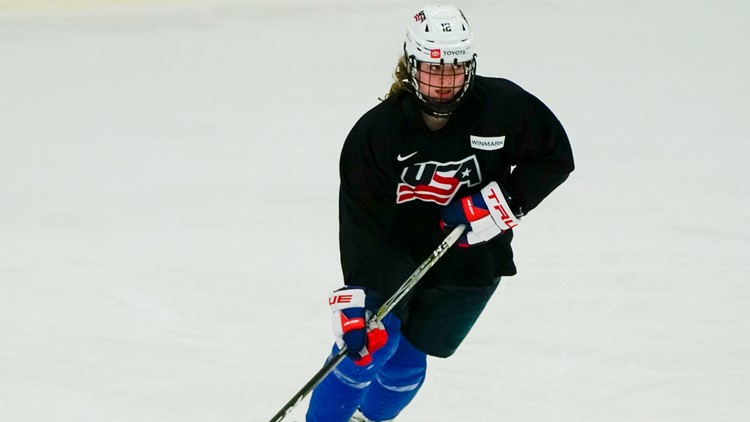MADISON, Wis. — Sydney Morrow recalls a time during the pandemic when the teenage hockey prospect had all three of her siblings and her mother living under the same roof.
Only they weren’t in their hometown of Darien, Connecticut. They instead were all in Minnesota as Morrow, her two brothers and sister honed their skills at Shattuck-St. Mary’s, a prep school that boasts one of the nation’s top hockey development programs.
“That was amazing because it combined living at home and being at the best prep school available, so I had the best of both worlds,” Morrow said.
Morrow’s situation was unique because she had most of her family with her, but her decision to leave home to develop her game wasn’t uncommon.
Nearly one-third of the players on the U.S. team competing in this week’s under-18 Women’s World Championships are training outside their home states at development programs such as Shattuck-St. Mary’s or Selects Hockey Academy, located just outside Rochester, New York.
“It was a choice my family and I were willing to make in order to help me achieve my dreams,” said Morrow, an 18-year-old defenseman who has signed to play at Ohio State.
The U.S. faces Canada Monday in the Gold Medal game at the University of Wisconsin’s LaBahn Arena. The women pounded their neighbors to the north 7-0 in the final day of the preliminary round June 9.
Deciding whether to leave home for training isn’t limited to girls' hockey. Aspiring male players have been facing similar dilemmas for years, with Shattuck-St. Mary’s having helped produce NHL stars such as Sidney Crosby, Jonathan Toews and Zach Parise. The distance is one hurdle and the programs can be expensive.
Morrow’s father, Steve Morrow, has sons and daughters playing top-level hockey. He said girls don’t have as many opportunities because their development programs aren’t as plentiful.
“There are certain areas of the country ... where you’re not necessarily going to be close to an ice rink,” said Kristen Wright, general manager of the under-18 team. “Maybe girls' hockey isn’t offered at your closest ice rink.”
U.S. national team player Brianna Decker recently established a foundation to help fund the development of hockey programs around the country to provide girls more places to play.
Some players have programs and rinks close to home. The U.S. roster for the under-18 world championships includes seven players from Minnesota and four from Michigan. All are currently training in their home states.
“It’s the right fit for some kids,” Wright said of moving. “For other kids, it’s not the right fit because they have the hockey opportunities available for them right there, especially as a lot of our girls' programs continue to grow.”
Steve Morrow cautioned that leaving home puts the girls in a “sink-or-swim” situation in which they must deal with being away from family while balancing athletic and academic demands.
“You really have to make sure they want it, that it’s their decision and not yours,” he said. “If it’s something they really want to do, chances are they’ll go head first and, yes, there will be bumps in the road, but they’ll figure out a way to get it done.”
Sydney Morrow and Maggie Scannell, a 16-year-old forward from Wynantskill, New York, tell similar stories about how they ended up at Shattuck-St. Mary’s.
Both played alongside boys until they reached the age in which body checking was allowed, increasing the risk of injury or concussions.
“I played one year of checking and absolutely loved it,” Scannell said. “But then the boys started getting bigger, and my coach and I decided it would be best if I play girls' hockey.”
At that point, she started looking at various programs and considered Shattuck-St. Mary's an ideal fit even though it was so far from home.
As the sport grows, families might not face this dilemma quite as often. Wright noted girls' programs teaching young players at the highest level have opened over the last couple of years in California, Arizona, North Carolina, Tennessee and Florida.
For Scannell, moving to Minnesota gave her easy access to all the facilities and training she’d need, though it also meant being away from her family.
“We can always FaceTime,” Scannell said. “They’re one call away and are always there to support me.”
Morrow didn’t have to worry about that as much because of her unique situation growing up in a hockey family.
“As early I could walk, I was stick-handling,” Morrow said.
Her older brother, Scott, is a St. Mary’s alum who plays for UMass. Her younger brother, Spencer, was on the Shattuck-St. Mary's 15-and-over team. Her younger sister, Sophie, was on the under-16 team.
Morrow said her mother even found a job that allowed her to stay with her kids in Minnesota, and they spent part of the pandemic together living across the street from campus.
“Even the mundane things like waking up and saying, ‘Hi,’ to your mom and dad, eating all your meals with your mom and dad, that’s something I missed out on,” Morrow said. “You miss out on some of the high school experience. But, honestly, I don’t regret it at all.”
Watch more of Minnesota sports:
Watch the latest sports videos - from high school hockey to the Minnesota Vikings and everything in between - in our YouTube playlist:



